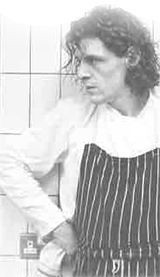I'm going to put my chef hat back on for this one. I've just read this article. Molecular Gastronomists (who thinks up this crap) can kiss my butt. Read the article in full before you read my reaction, an extract below.
MONTREAL—On a Tuesday night in early fall at the Montreal Science Centre's IMAX theatre, Hervé This, a tallish man with wispy, grey hair, paces the short length of a makeshift stage with evangelical fervor. Wearing a pale grey suit and his trademark white, un-collared shirt, he holds an egg at eye level.
"Imagine you have only one egg," he says. "It is not a question of money to cook a good egg or a bad egg. It is a question of knowledge."
This, a physical chemist, wants to bring the scientific method to the kitchen. At his laboratory in the Collège de France in Paris, he and his students debunk dictums, test old wives tales, and pare dishes down to their barest elements before rebuilding them into new food blends and innovative cuisine.
Molecular gastronomists—as these chefs-cum-chemists are known—study the science of culinary transformations and the sensory phenomena associated with eating. They are concerned with the chemistry of taste and the physics of texture.
.
Okay, so you want to make cooking a purely scientific operation. Can I just ask what the fuck for? This dude This, no pun intended, obviously has never really cooked, he's never really ever plunged his hands into some ingredients and teased, nurtured, enticed, carressed, cajoled or willed them into a dish so sublime that you can call it art.
.
Sunshine if you only have one egg, go get a better paying job and buy a dozen more of them and make a savoury three cheese souffle or even a snow egg and drizzle it in pure sweet sugary caramel. Or simply soft poach it and place it upon some crusty toasted bread and sprinkle it with cracked black pepper and sea salt.
.
Then once you've done all of that eat the stuff, savour its simplistic (yet complicated) goodness. My real point is that if you take the innovation out of cooking then you simply end up with something akin to the shite they pass off as food on airlines these days. Par cooked cryogenically frozen meals re heated in an instant and slopped in front of the drone like zombies that eat this crap. That's what your "science" has done for cooking lately.
.
How do you think some of the greatest dishes known to man were created? By trial and error and even the odd "Oh my god how the fuck did that happen" favourable accident.
.
I'll leave the final word or look to my hero and guru Marco Pierre White. His face says it all.
Yes Hervé This, Marco is thinking how best to shove that egg up your scientific butthole. Maybe use a fine first pressed olive oil as a lubricant or better still deep fry it in a polenta crust and then insert.

Comments
That sentence pretty much sums up whether we like food or dislike it.
Take fruit, one of the simplest foods we eat, one apple you may like because its crisp and sweet the next (same variety different grower ) you spit out because its soft and/or bitter.
basically the "Molecular gastronomists" (crock word) are saying if you undertand the food your cooking youll get beter flavour ( ie cooking food x above 60oC will give it a bitter flavour and smell and ruin the dinner you wanted to prepare)
oh yeah - interesting blog btw..
If you catch my drift